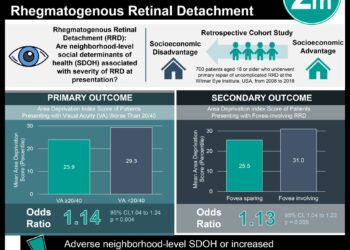Social screening in community health clinics does not consistently improve early childhood health
1. In a randomized control trial of the social care screening program WE CARE, health benefits for children ages 0 to 3 were mixed, with improvements in immunization uptake but increased ED visits and hospitalizations.
2. Implementation of the WE CARE program by community health clinics was poor, with fewer than one-third of eligible visits documenting a screener.
Evidence Rating Level: 1 (Excellent)
Study Rundown: Screening for social risk factors has become increasingly common in pediatric practice. However, despite such screening being formally recommended by the American Academy of Pediatrics, there have been few studies evaluating the impact of screenings in real-world settings. This study implemented a randomized control trial (RCT) to evaluate the effectiveness of WE CARE, a social care screening program in community health centers in Boston, MA. Clinics randomized to the WE CARE trial arm received (1) training in implementing a 14-question social care screener for families with children ages 0 to 3; (2) corresponding community resource sheets to share with families who indicated a desire for support; and (3) access to a peer patient navigator who was on-site at least one day per week. The uptake of WE CARE was poor; screeners were distributed in only 28.9% of eligible visits. Children at WE CARE clinics received more resource referrals and a higher proportion of recommended vaccines. However, these children were also more likely to seek care at the emergency department and to be hospitalized. The randomized control trial design of this study is a significant strength, as it enables direct causal investigation. However, the study was limited by poor implementation, with the authors acknowledging that not enough support was offered to clinics learning the WE CARE system; and by the significant potential for confounding due to timing effects, as national interest in social care screening increased substantially over the course of the trial, which may have contaminated the control group. Overall, more work is needed to understand what enables effective social screening interventions to be adopted by community health clinics and to understand the consequences for pediatric health when such interventions are conducted with high fidelity.
Click to read the study in Pediatrics
Relevant Reading: Implementing social determinants of health screening at community health centers: Clinician and staff perspectives
In-Depth [randomized controlled trial]: Using a type 1 hybrid effectiveness-implementation RCT design, this study examined the causal impact of community health clinics (CHCs) implementing WE CARE, a social care screening program for children ages 0 to 3. The WE CARE intervention included a 1-hour introductory session to the screening resources and five 30-minute booster sessions over the study period. Six CHCs were randomized 1:1 to receive either the WE CARE intervention or usual care. Group assignment was concealed until after CHCs agreed to participate, and ultimately one control group was dropped due to contamination after electing to implement a similar social care system, leaving 3 CHCs in the intervention arm and 2 in the control arm. All parent-child dyads who presented for newborn visits between September 2015 and March 2017 were eligible for inclusion in the study, excluding children born before 32 weeks gestation, with commercial insurance, with a chronic disease, and/or living with foster parents. In total, 524 children were included in the intervention arm and 354 in the control arm. Data on health care utilization and referral to resources were extracted post-hoc via electronic health record (EHR) review. Implementation fidelity of WE CARE was poor, with only 28.9% of eligible visits at CHCs in the experimental arm documenting a screener scanned into the EHR. WE CARE families received significantly more resource referrals (aOR = 4.6; 95% CI: 2.0-5.6) and children had higher immunization rates (p = 0.003). However, WE CARE children were also more likely to visit the emergency room (aOR = 2.4; 95% CI: 2.0-2.9) and to be hospitalized (aOR = 1.3; 95% CI: 1.03-1.7). No difference in child maltreatment outcomes was found between the two groups.
Image: PD
©2023 2 Minute Medicine, Inc. All rights reserved. No works may be reproduced without expressed written consent from 2 Minute Medicine, Inc. Inquire about licensing here. No article should be construed as medical advice and is not intended as such by the authors or by 2 Minute Medicine, Inc.







